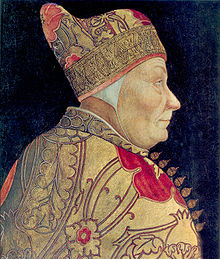Francesco Foscari
| Francesco Foscari | |
|---|---|

Portrait by Lazzaro Bastiani
(Museo Correr, Venice). |
|
| Reign | 15 April 1423 – 22 October 1457 |
| Predecessor | Tommaso Mocenigo |
| Successor | Pasquale Malipiero |
| Born |
19 June 1373 Venice |
| Died | 1 November 1457 (aged 84) Santa Margherita, Venice |
| Burial | Santa Maria Gloriosa dei Frari, Venice |
| House | Foscari |
Francesco Foscari (19 June 1373 – 1 November 1457) was the 65th Doge of the Republic of Venice from 1423 to 1457. His reign, the longest of all Doges in Venetian history, lasted 34 years, 6 months and 8 days, and coincided with the inception of the Italian Renaissance.
Francesco Foscari was born in 1373, as the oldest son of Niccolò Foscari and his wife Cateruzia Michiel. The Foscari family had been of only moderate importance, but had managed to become one of the few noble families that secured a hereditary place in the Great Council of Venice after the so-called Serrata ("Closing") of the Great Council, and had begun to rise in prominence throughout the 14th century. Francesco's ancestors began holding high public office, and his father Niccolò even became a member of the powerful Council of Ten.
Francesco served the Republic of Venice in numerous official capacities—as ambassador, president of the Forty, member of the Council of Ten, inquisitor, Procuratore di San Marco,avvogadore di comun— before he was elected in 1423 defeating the other candidate, Pietro Loredan. His task as doge was to lead Venice in a long and protracted series of wars against Milan, governed by the Visconti, who were attempting to dominate all of northern Italy. Despite the justification of Venetian embroilment in the terraferma that was offered in Foscari's funeral oration, delivered by the humanist senator and historian Bernardo Giustiniani, and some victories, the war was extremely costly to Venice, whose real source of wealth and power was at sea. Venice, which during Foscari's leadership abandoned her ally Florence, was eventually overcome by the forces of Milan under the leadership of Francesco Sforza. Sforza soon made peace with Florence, however, leaving Venice alone.
...
Wikipedia
